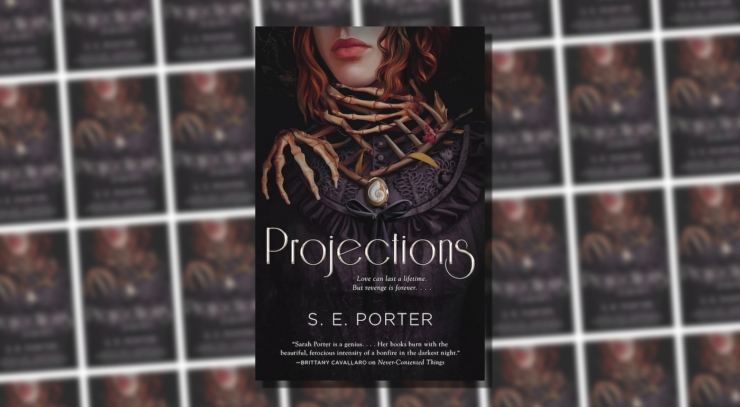The last book I read by S.E.—who sometimes goes by Sarah—Porter was the YA novel Vassa in the Night, a (loose, wild) retelling of the story “Vasilisa the Beautiful.” In that book, Baba Yaga (sorry, Babs Yagg) has a bodega in Brooklyn, which makes a perfect kind of sense. A young woman contends with all kinds of unruly forces. Things get very dark, and very weird.
Projections, Porter’s adult debut, is not a fairytale retelling, but it is my favorite kind of book: An entirely original work that has the certainty, the wildness, the sense of inevitability that makes it feel like a story you already know, cast into a new shape. And that’s because you do know this story, in a way. We all know this story: the story of male entitlement.
Once upon a time, in the mid-1800s, there was a girl and a boy, and they were friends, though the boy was quite wealthy and the girl’s family worked in his family’s big fancy house. He let her borrow his books; she thrilled to the natural world, finding the beauty in a stalk of wheat or the quality of the light. He was certain they were meant to be—or really, certain that they were one person in two bodies. She was part of him.
She, having some rather understandable ideas about being her own person, resisted this narrative. So he killed her. And she did not go quietly.
That, in essence, is the backstory of Projections, which picks up at the moment of Catherine’s murder at the hands of young, entitled Angus Farrow. Caught forever in the moment of the scream she let loose before she died, Catherine becomes a ghost, forever attached to Angus, always screaming. (Porter will remind you sometimes that Catherine’s ghost is also rotting and terrifying, but she lets you forget about that, from time to time. It’s very kind of her.)
Buy the Book


Projections
But Angus, with the arrogance of someone who has never been denied anything, isn’t put off. This Catherine didn’t love him properly, but surely other versions of her will. He has been studying sorcery, spending his days in the timeless, magical, incredible, terrible city of Nautilus, which reorganizes itself every time a new person rises to the seat of power. If he plays his cards right, he’ll have centuries in which to send out projections of himself, half-baked magical people who exist only to find the next Catherine and see if she’s the right one. If she is, she’ll love him. If she isn’t, he’ll kill her.
Porter’s narrative is split into three eras: Catherine tells her story in the past tense, alternating between her ghostly existence and her life before Angus murdered her. Decades later, Gus, the latest projection, lives only in the moment, in present tense, and bumbles around trying to get a girl named Geneva to fall in love with him. He runs into a gaggle of folks who seem to know things he doesn’t, and among them is a woman named Delores (who, delightfully, goes by Lore). Her magic, and her anger, also lead back to Angus, but it would be rude to say exactly how.
Projections is a book that asks a lot of its reader. Catherine’s narrative is complex, her diction formal. She doesn’t let you in easy, and that is part of the point. She has, at the point from which she tells her story, been waiting decades to be able to communicate with anyone. Her ghost only screams; she can’t talk, or touch things, or do anything. Angus has rendered her the next-closest thing to a part of him.
But Catherine still has her mind, her interests, her cleverness, and her own power.
There’s a rich Gothic streak in Projections, running from the seance in Angus’s family’s house all the way to the magical city of Nautilus, a place with its own logic and its own allure. It’s as vivid and rich as Porter’s anger and her passion. Nautilus is full of rooms without doors and the most beguiling pub (with its own magical fire), populated with con men and bribe-taking officials and sorcerers of all stripes. One resident is a large, poetry-writing frog named Anura. She was not always a frog, but in Nautilus, she can have the body that feels like home to her. Rude people don’t understand her, but Catherine does.
Their tentative, slow-building connection is a much-needed respite in Catherine’s existence—and a breather for the reader. When we’re with Gus, it’s exhausting, intentionally so: He is an endless fount of need and selfishness, the heart of Angus’s entitlement bound up into a being who’s not even a whole person. It is possible to feel bad for him sometimes, because Porter carefully delineates how he is not responsible for his existence, his limitations. But he is responsible for his choices.
Porter’s story is set in motion by Angus’s selfish act, but its movement and fire comes from women: From Catherine, biding her time to find her peace; from Anura, patient and warm; from Lore, with her own motivations; and even from Angus’s aunt Margo, who looms protectively over Angus and Catherine’s childhood until Angus takes away her agency, too. At nearly 500 pages, Projections requires and rewards patience. The language is elegant and lush, the pace stately, the horrors intimate and unforgettable. This is a story about fury, justice, and freedom, but also about connection and love—what it looks like, what it offers, what it isn’t.
Projections is published by Tor Books.










